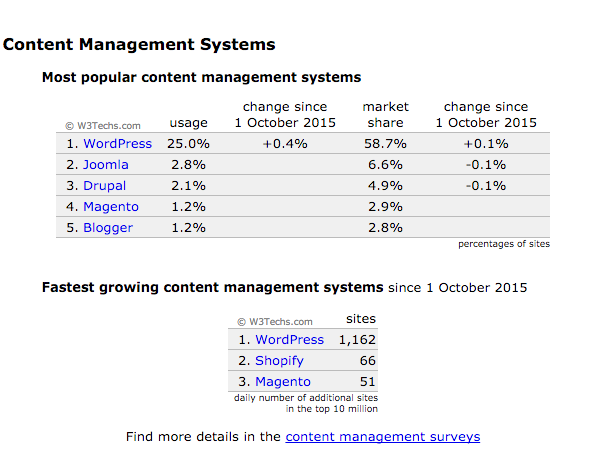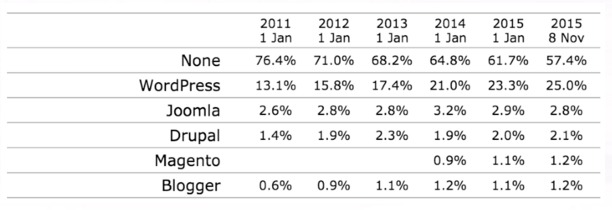GDPR: How we help you
How does GDPR affect the data stored on your website hosted by Terra Ferma Media? Yes, but it's all under control writes David Fernando.
The GDPR deadline (25th May 2018) is almost upon us. Businesses across the EU have been slowly waking up to the notion that certain things need to be in order to be completely compliant with the new legislation. If you haven’t yet got on board with any of this, the best source of information in the UK is the Information Commissioner’s Office (ICO), specifically here.
But how does GDPR affect the data stored on your website hosted by Terra Ferma Media? Don’t worry, we’ve got your back.
"Don't worry, we've got your back"
As the owner of your website, you are what’s known as the controller and owner of your customer data. By working with that data on your behalf, we, Terra Ferma Media is the processor of that data.
Here’s a few other things we’re also doing on your behalf:
- We’ll be writing to those of you who need to update any sign-up forms that may be present on your websites.
- We’ll also flag up to those of you that should have an updated privacy policy on your site (and suggest a sample for you to use which we can then upload).
- If we design and distribute e-newsletters on your behalf, the system we use is already GDPR compliant. However, we do suggest that any customers who have not opened one of your emails for some time be removed from the mailing list.
- If you host your website with us, don’t worry, you’re already covered.
Our hosting partner, WP Engine, is the world’s largest WordPress website hosting specialist, renowned for being tip-top secure (as well as fast, easy to work with and all that other good stuff). On the matter of GDPR, they state,
“WP Engine continually monitors developments in data security, privacy, and compliance around the globe, and we have invested considerable resources in preparing for EU Regulation 2016/679 (“GDPR”) which comes into force May 25, 2018. We have always upheld the core principles behind GDPR, as evidenced by our early adoption of the EU-US and Swiss-US Privacy Shield programs, and take very seriously the trust our customers place in us when they choose to store personal data on our platform.
WP Engine will comply with GDPR’s requirements, both as a controller of our customers’ account data and a processor of the end-user personal data our customers control. In support of our customers’ own compliance efforts, we are updating our privacy terms to reflect the obligations we have as a processor under GDPR. ”
So there you have it. If you host your website through Terra Ferma Media, the data you store will be protected in compliance with GDPR.
This is made even more secure by the fact that all sites hosted with us have SSL certificates, meaning that any data transmitted during the normal operation of your website is encrypted and cannot be accessed by unauthorised 3rd parties.
So whilst there are other areas of your business you will need to audit for GDPR compliance, at least you know that your website, hosted by Terra Ferma Media will be fully compliant.
The AI Revolution: What is it and why will it matter?
AI is the buzz word in today’s tech world. Artificial Intelligence is leaping out of science fiction and into reality. But what is it? And how does it differ from what we think it is in films and books? Web Development Manager, Adam Leone examines...
Whereas film directors like James Cameron and the like will have us believe that artificial intelligence involves legions of time travelling, Austrian flavoured robots seeking to destroy the human race – the truth of the matter is that we’re nowhere near that point and we’re unlikely to see the day that technology takes over humanity. (Personally, I’m more worried more about some of the people in power than a bunch of robots).
The reason being is that Amazon, Google, Facebook, IBM, and Microsoft have recently formed a partnership that evolves around Artificial Intelligence and its benefit to people and society. This organisation is called the Partnership on Artificial Intelligence to Benefit People and Society – a super catchy title if I say so myself! Their aim is to set the principals on what AI is and what it should be used for as the industry develops.
"With artificial intelligence we’re summoning the demon."
- Elon Musk
What is AI?
To answer this question as simply as possible, it’s best to understand the principals of a normal computer, which work like this…
- Input – We input some data in the form of symbols, numbers, equations…etc.
- Processing – The computer manipulates the inputted data based on a set of algorithms. An algorithm is a set of rules that we the human has set that are then followed
- Output – the result of the above symbols and processed rules on a screen, piece of paper, server or hard drive
With AI however…
- Input – input consists of sight (symbols, objects), sound (language, music, noises), touch (temperature, texture, pressure), smell (odours, minute particles) or taste (chemicals, sweet, sour, ingredients)
- Processing – The computer uses the input and uses pattern matching, logic, problem solving and knowledge representation (the key ingredient) to determine the output
- Output – The computer will react based on the above. The reaction could be anything from printing something on a screen to launching a series of nuclear warheads…
Why does AI matter?
AI matters because it’s a completely new technology and will form a whole new industry. With all new technologies and industries, it will either complement or disrupt the world in which we live. This is assuming that AI will explode into the mainstream.
According to Stephen Hawking, humanity is hindered by evolution, which is a slow process taking place over the course of thousands of years, compared to the growth in processing power outlined in Moors Law.
AI machines could soon replace jobs and history tells us that unemployment is a by product of all technological advances. Elon Musk has described the birth of AI as “summoning the demon” which in its self is a very telling indictment. Essentially what he means is, we don’t know what we’re dealing with.
Alternatively, if artificial intelligence is in fact, artificial (fake intelligence) based on what we, the human race, tell it – does this mean that AI will lack the ability to innovate? In which case, the moveable definition of what a robot is will become no more than a convenience item for every home. Wouldn’t it be great if all of the things that take up time in our lives (like cooking, cleaning, ironing, washing…etc) could be done by a machine, based on a lifestyles.
What do I think?
I’ve only done some light research for the purposes of this article and it’s safe to say that there’s swathes of documentation on AI and it’s potential to the human race, be it good or bad.
I haven’t yet made up my mind on whether AI is something that should be explored or stifled.
If AI does form a new industry, I believe that it should be more regulated than other technologies. We should keep on top of developments in Artificial Intelligence so that it doesn’t lead to the destruction of mankind.
Is that really too much to ask?
How much is your privacy worth?
Do you think you behave differently when you know you're being watched? Web Development Manager Adam Leone discusses the issue of privacy in the ever-growing world of home devices and assistants.
In 2013, Dave Eggers wrote “The Circle” which is the story of Mae Holland and her place as a new employee at The Circle – a technology company aimed at developing new, sophisticated consumer based products.
After being recruited as a customer experience type person – Mae becomes overwhelmed with the facilities available for employees at The Circle, these include gyms, recreational activities, free food and parties… (Any of this sound familiar?)
The Circle is pioneering the SeeChange program, where participants wear a light, portable, camera that records every move and conversation that you make. Politicians are encouraged to wear them in a bid to become more transparent and appeal to voters. “Going transparent” is then coined as a term you use when you decide to enter the SeeChange program.
There’s a lot of toing and froing as to whether this is a good thing or not – this does after all make the world a more truthful place to live in.
I won’t spoil the story of Mae Holland for you – but the main focus is that The Circle has found a way to aggregate and store the moves and conversations of every individual – and then use that information to satisfy their own means. More importantly, they’ve made all of this reasonable and socially acceptable.
The Circle has been made into a film starring Emma Watson and Tom Hanks – and I for one can’t wait to see it!
"participants wear a light, portable, camera that records every move and conversation that you make"
Have you ever watched the Black Mirror episode called The Entire History of You? In this episode, the characters have been given a device called a “grain” which is implanted into their necks. The grain records everything they experience and they can then play back those moments in front of their own eyes, or on a screen. The story follows what impact the grain has both mentally and socially.
Becoming paranoid and less happy is a symptom of constantly going back through those experiences and analysing them. The sad part is, ultimately there’s nothing you can do about those actions except watch them over and over again. These experiences are stored somewhere at your request or approval.
The above may all sound a bit far-fetched, but is it?
It’s almost no secret that smartphones are recording your every move and conversations. We know we’re being tracked via GPS so that the maps app works perfectly. And we all have those moments whereby we look at the adverts on our phone or on a computer and realise “I was talking about that with so and so the other day…”
Google and Amazon have taken living in The Circle and recording the entire history of you one step further by selling their representatives (or assistants) to live in your own home – rent free, you’ll have to pay if you would like one of these.
I am of course talking about the new wave of home devices called Alexa and Google Home.
These devices can manage your temperature, music, shopping lists, other mobile devices – and you can even talk to them and ask questions. These devices are on all the time, so no need to worry about them breaking down or running out of battery. Great!
They are of course recording your private, home based conversations let’s not forget – but that’s OK, because you wouldn’t be doing anything you wouldn’t want anyone else to find out about right? So let’s say goodbye to privacy and rejoice at the age of transparency. How do you feel about that?
I’m not against home devices, but I’m just taking a moment to stop and think about the implications of owning one of these robots.
What is Google and Amazon selling here? What’s in the small print of owning one of these assistants? How much easier will our lives really be?
I can’t say that I’m convinced at this privacy trade off. Surely if Google, Amazon, Facebook and the like want to get hold of our thoughts via conversation – to sell to advertisers, shouldn’t they start paying us?
OK – their services are free to use, but surely this method of infiltrating someone’s private life now tips the balance? If they did pay you for this private information – how much is your privacy worth?
I’d love to know your thoughts, especially if you work for Google or Amazon!
The end of Internet Explorer
You might remember that Microsoft released Windows 10 late last year. Ringing any bells? What you may, or may not, have noticed, is Microsoft Edge. That's Microsoft's new web browser, their answer to the slow death of Internet Explorer (IE).
IE has been losing the battle of web browsers for years now, particularly since Google Chrome and Mozilla Firefox have been on the scene. Microsoft knew they needed to get their act together and hence created Microsoft Edge, their brand new web browser. Admittedly, we don't quite think Edge has taken off as well as they'd liked it to - I guess the Chrome and Firefox users are thinking "If it ain't broke...", which is fair enough. Both browsers work really well.
This being said, Microsoft Edge is slowly taking over Internet Explorer completely. In fact, as of January 12th, the software giant will no longer provide security updates or technical support for IE 8, 9 and 10. That means if you're still using those browsers, you could be vulnerable to threats. Microsoft are keeping IE 11 for now, so we'd recommend upgrading to the latest version if you want to hold on to the browser. Otherwise, you'll need to pack in IE altogether and get used to Edge.
To be honest, we're not surprised to see the back of IE. We've not got the best wrap with it, in fact, we've found it quite problematic in the past. We are strong believers in Google, so our advice would be to make the move to Google Chrome if you're wondering where to turn.
RIP Internet Explorer.
25% of the Internet is managed by WordPress
Breaking news! WordPress co-founder Matt Mullenweg broke some pretty big news on 9th November this year - WordPress now manages 25 percent of the Internet. That means a quarter of all websites built are made using WordPress - that's a LOT!
The guys at W3Techs (responsible for the most reliable and extensive web technology surveys) crunched the numbers and broke down the Internet by popular content management systems, and WordPress far exceeded number two on the list, Joomla, at 2.8 percent.

W3Tech also shows that WordPress has been the fastest growing CMS, in fact useage grew 1.7 percent since January to now (November 2015), which is a huge increase compared to the competition.

Mullenweg mentioned that these numbers usually change with every month, but that it's pretty exciting WordPress supports one in four of all websites.
It's not gone to the co-founder's head though, as Mullenweg remarked “The big opportunity is still the 57% of websites that don’t use any identifiable CMS yet, and that’s where I think there is still a ton of growth for us (and I’m also rooting for all the other open source CMSes)".
The future definitely seems bright for WordPress!
A lot can change in four years...
Websites are living, breathing things, and like us humans, they age too. But unlike us humans, websites can actually grow younger (we're totally not jealous) with a little bit of help from, well, us! And here's a perfect example:
One of our longest standing clients, Champor-Champor, a super delicious Thai restaurant in the heart of London, came to us over four years ago looking to create a website for their swanky restaurant. Obviously we jumped at the chance and created a beautiful, easy-to-navigate and fully functioning website.
Fast forward four years and guess what? Things have changed. WordPress designs are more seamless, better designed for user experience and generally look modern and cutting-edge. Let's just say it takes a lot less time for a website to become vintage than say, a car! It was definitely time for a refresh.
So what did we change? Pretty much everything. Whilst we used the same content (which has been continuously updated throughout the years), we're using a brand new parallax theme which essentially structures the website into one fell swoop (or one fell scroll, if you will). Parallax themes have become really popular over the last year and can really add that "wow" factor to a website.
We've also utilised some professional images our client had, displaying them in a full screen way that their old website simply wouldn't have been able to achieve. We could go on, but simply put: the whole website has had a complete upheaval and refresh. And we (that's us AND our client) love it. Have a peep here.
Trust us, a LOT can change in four years. In fact, a lot can change in even just a day with the ever-evolving internet, whether it's new features, new apps and plugins, or simply new trends. It's definitely crucial to keep up with the Joneses when it comes to websites, and luckily that's our job! Think your website might need a refresh? We're always happy to have an informal chat, so pop us an email or give us a bell.
Five reasons why WordPress is the best for blogging and websites
Here at Terra Ferma we’re pretty evangelical about WordPress. As a free blogging platform and the backbone for premium websites, Wordpress has loads of advantages for different users: businesses and bloggers alike can benefit from its dynamic themes, SEO friendliness, fantastic functionality, incredible usability...the list goes on. In fact, 15% of the top 1,000,000 websites in the world use WordPress (including The New York Times and Time Magazine Blog). This can all seem a bit intimidating for the humble blogger, yet this evolving and expanding platform should still be the top choice for your blog.
Almost five years ago I decided that I’d like to channel a passion for cooking and eating into a blog. I’d admit it; I had no idea what I was doing. Since then I’ve learned a few things about how easy it can be to create, nurture and expand a Wordpress blog.
So here are five reasons why WordPress is the only word in blogging:
- You don’t have to be a computer whiz to use Wordpress
Creating a WordPress site; choosing a theme; and uploading your first post is simplicity itself. As long as you know how to open a web browser, you can create your very own blog. Of course, if you would like help developing your site, you can get all the support you need from WordPress savvy website development experts like us!
- Perfect for the technologically savvy
WordPress blogs can be as simple or as sophisticated as you want. With lots of additional functions, it offers the opportunity for users to gradually develop their blog. Whereas other blogging platforms leave you high and dry when you want to change things up a bit, Wordpress always offers easy ways to improve your site.
- It offers amazing themes
WordPress offers a fantastic choice of free designs as well as a huge catalogue of Premium themes. Whether you want a personal gardening blog, or one to showcase your business, there’ll be a theme to accommodate it!
- It’s incredibly popular
Wordpress really dominates the blogging world and has been around for over a decade. This means that users instinctively know their way around Wordpress sites, making it really easy for site visitors to navigate. You might have fantastic content, but if your reader can’t make head to toe of your blog’s layout, they’re not going to stick around.
- Content is easy to manage
In the digital world, content is king. It doesn’t matter how flashy your site is, if you can’t easily manage and clearly display your fantastic content, you won’t be able to draw the readers in. WordPress also have a great app – perfect for uploading posts and photos on the move!
Perhaps the best thing about WordPress is its potential. If you’d like to find out how to get the most out of your blog then please get in touch.








